Digital Technology Impact on Leadership and Management Styles
VerifiedAdded on 2023/04/08
|6
|1297
|477
Report
AI Summary
This report investigates the impact of digital technology on management and leadership styles within the service industry, focusing on three restaurant chains: Tas, Haz, and Hazev. It begins by assessing classical management theories, including Scientific Management, Administrative Management, and Bureaucratic Management, to understand the approaches used by the managers. The report then explains the role of a leader and various leadership styles such as strategic, democratic, and situational leadership. A detailed review of the leadership and management styles followed by the managers in Tas, Haz, and Hazev is provided, highlighting how they apply different theories and styles. Finally, the report analyzes the effect of digitization on both the external and internal management styles of these organizations, concluding that digital technology has a significant impact on making business processes easier and more efficient. Desklib offers this assignment solution and many other resources to aid students in their studies.
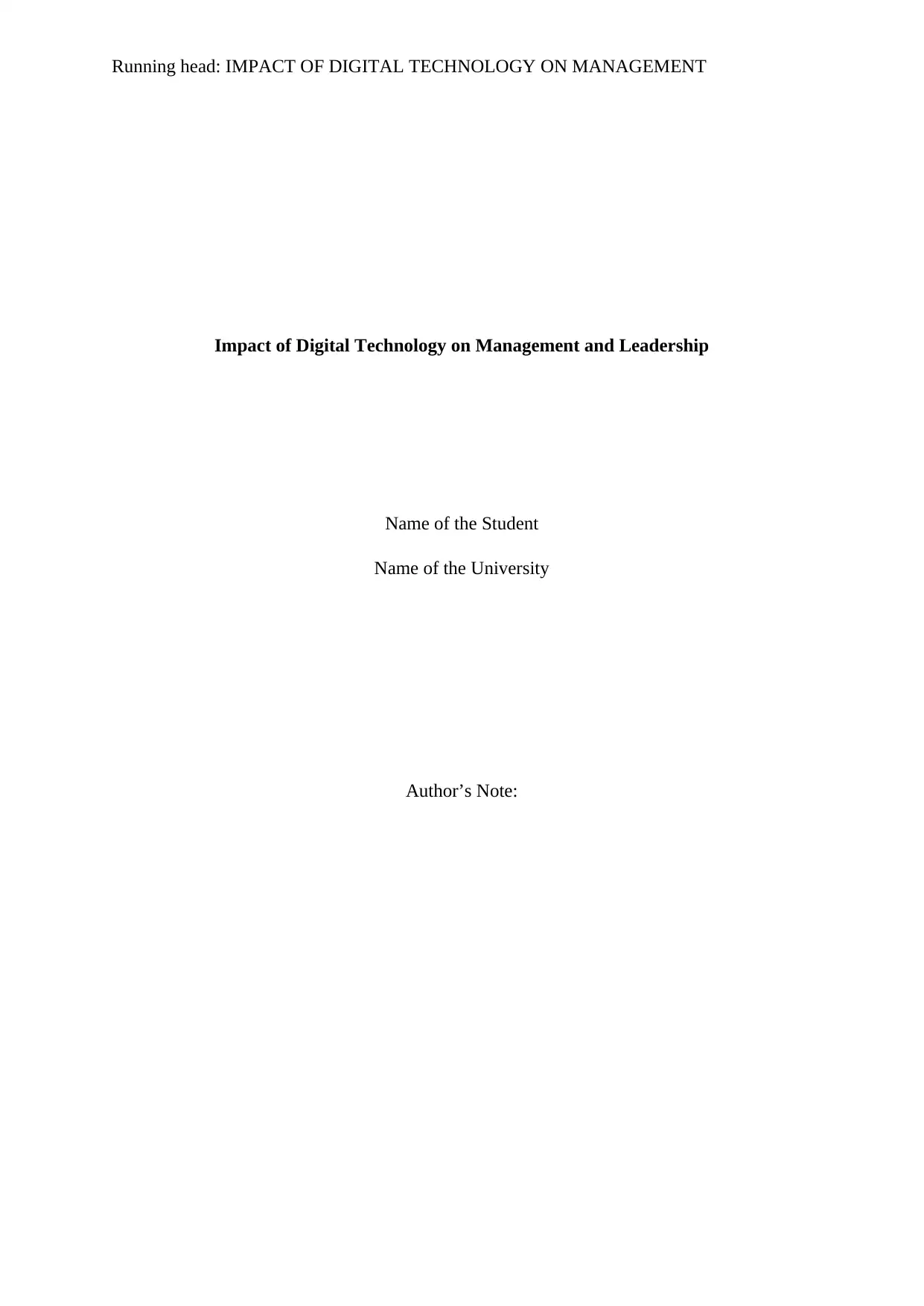
Running head: IMPACT OF DIGITAL TECHNOLOGY ON MANAGEMENT
Impact of Digital Technology on Management and Leadership
Name of the Student
Name of the University
Author’s Note:
Impact of Digital Technology on Management and Leadership
Name of the Student
Name of the University
Author’s Note:
Paraphrase This Document
Need a fresh take? Get an instant paraphrase of this document with our AI Paraphraser
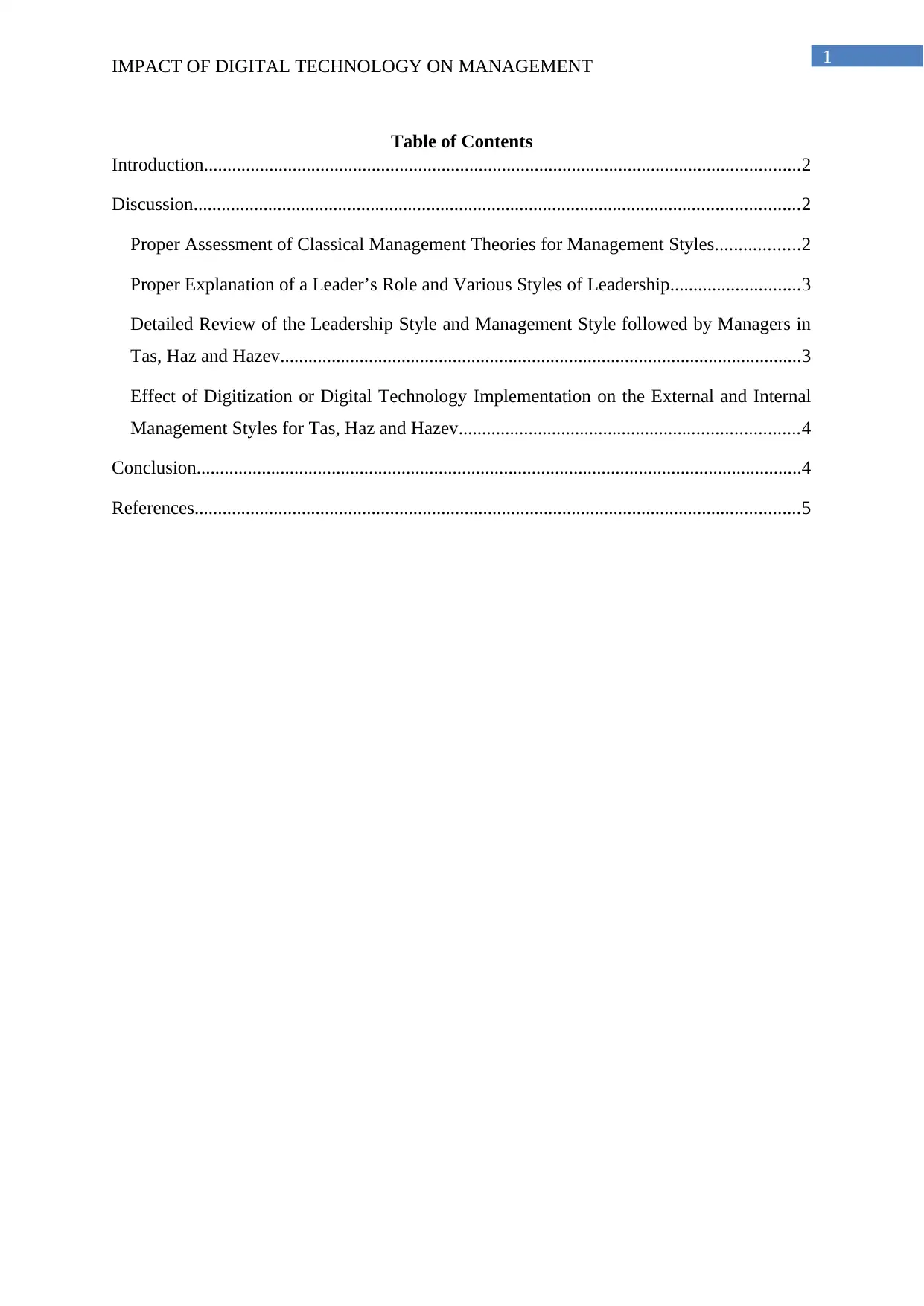
1
IMPACT OF DIGITAL TECHNOLOGY ON MANAGEMENT
Table of Contents
Introduction................................................................................................................................2
Discussion..................................................................................................................................2
Proper Assessment of Classical Management Theories for Management Styles..................2
Proper Explanation of a Leader’s Role and Various Styles of Leadership............................3
Detailed Review of the Leadership Style and Management Style followed by Managers in
Tas, Haz and Hazev................................................................................................................3
Effect of Digitization or Digital Technology Implementation on the External and Internal
Management Styles for Tas, Haz and Hazev.........................................................................4
Conclusion..................................................................................................................................4
References..................................................................................................................................5
IMPACT OF DIGITAL TECHNOLOGY ON MANAGEMENT
Table of Contents
Introduction................................................................................................................................2
Discussion..................................................................................................................................2
Proper Assessment of Classical Management Theories for Management Styles..................2
Proper Explanation of a Leader’s Role and Various Styles of Leadership............................3
Detailed Review of the Leadership Style and Management Style followed by Managers in
Tas, Haz and Hazev................................................................................................................3
Effect of Digitization or Digital Technology Implementation on the External and Internal
Management Styles for Tas, Haz and Hazev.........................................................................4
Conclusion..................................................................................................................................4
References..................................................................................................................................5
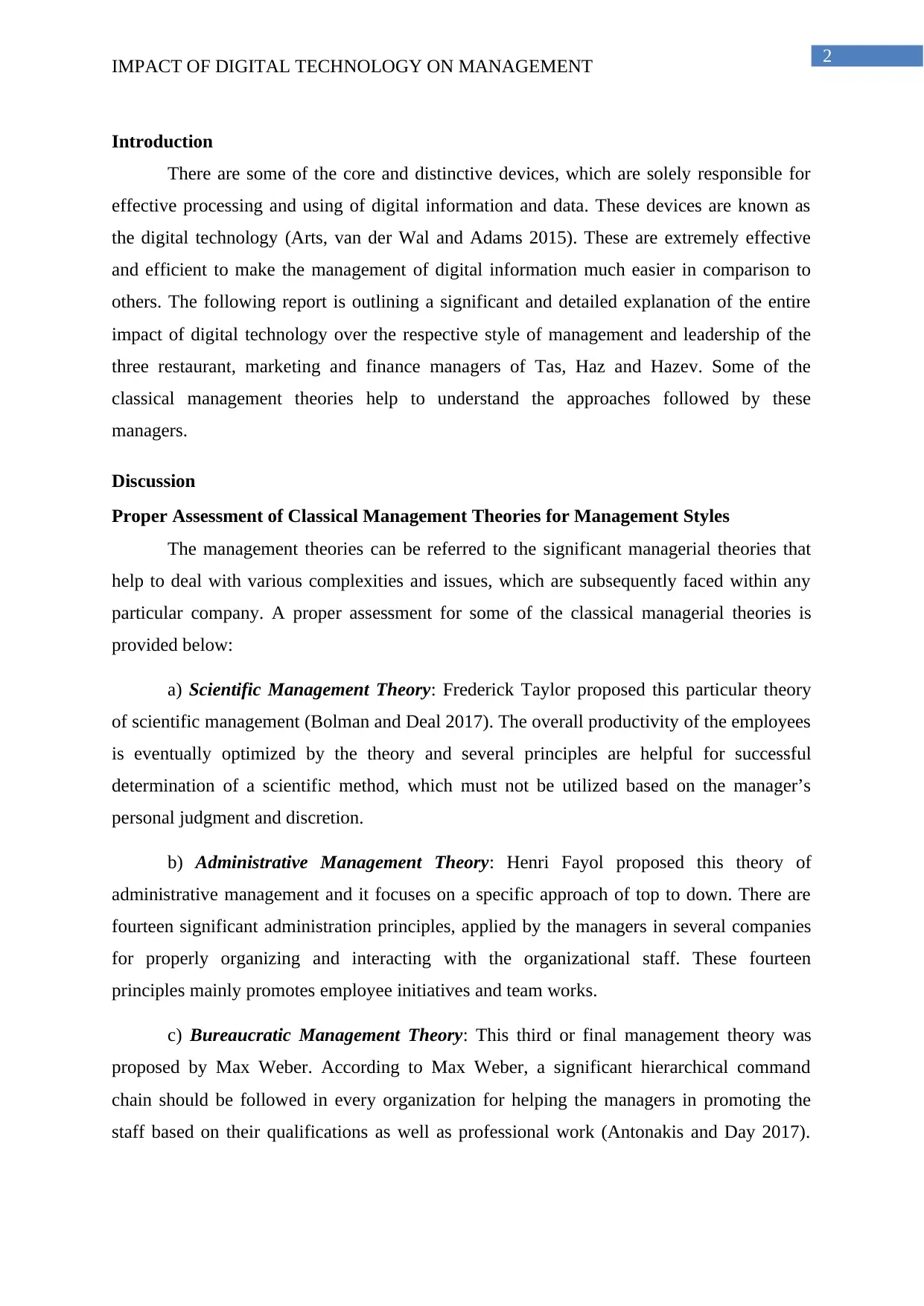
2
IMPACT OF DIGITAL TECHNOLOGY ON MANAGEMENT
Introduction
There are some of the core and distinctive devices, which are solely responsible for
effective processing and using of digital information and data. These devices are known as
the digital technology (Arts, van der Wal and Adams 2015). These are extremely effective
and efficient to make the management of digital information much easier in comparison to
others. The following report is outlining a significant and detailed explanation of the entire
impact of digital technology over the respective style of management and leadership of the
three restaurant, marketing and finance managers of Tas, Haz and Hazev. Some of the
classical management theories help to understand the approaches followed by these
managers.
Discussion
Proper Assessment of Classical Management Theories for Management Styles
The management theories can be referred to the significant managerial theories that
help to deal with various complexities and issues, which are subsequently faced within any
particular company. A proper assessment for some of the classical managerial theories is
provided below:
a) Scientific Management Theory: Frederick Taylor proposed this particular theory
of scientific management (Bolman and Deal 2017). The overall productivity of the employees
is eventually optimized by the theory and several principles are helpful for successful
determination of a scientific method, which must not be utilized based on the manager’s
personal judgment and discretion.
b) Administrative Management Theory: Henri Fayol proposed this theory of
administrative management and it focuses on a specific approach of top to down. There are
fourteen significant administration principles, applied by the managers in several companies
for properly organizing and interacting with the organizational staff. These fourteen
principles mainly promotes employee initiatives and team works.
c) Bureaucratic Management Theory: This third or final management theory was
proposed by Max Weber. According to Max Weber, a significant hierarchical command
chain should be followed in every organization for helping the managers in promoting the
staff based on their qualifications as well as professional work (Antonakis and Day 2017).
IMPACT OF DIGITAL TECHNOLOGY ON MANAGEMENT
Introduction
There are some of the core and distinctive devices, which are solely responsible for
effective processing and using of digital information and data. These devices are known as
the digital technology (Arts, van der Wal and Adams 2015). These are extremely effective
and efficient to make the management of digital information much easier in comparison to
others. The following report is outlining a significant and detailed explanation of the entire
impact of digital technology over the respective style of management and leadership of the
three restaurant, marketing and finance managers of Tas, Haz and Hazev. Some of the
classical management theories help to understand the approaches followed by these
managers.
Discussion
Proper Assessment of Classical Management Theories for Management Styles
The management theories can be referred to the significant managerial theories that
help to deal with various complexities and issues, which are subsequently faced within any
particular company. A proper assessment for some of the classical managerial theories is
provided below:
a) Scientific Management Theory: Frederick Taylor proposed this particular theory
of scientific management (Bolman and Deal 2017). The overall productivity of the employees
is eventually optimized by the theory and several principles are helpful for successful
determination of a scientific method, which must not be utilized based on the manager’s
personal judgment and discretion.
b) Administrative Management Theory: Henri Fayol proposed this theory of
administrative management and it focuses on a specific approach of top to down. There are
fourteen significant administration principles, applied by the managers in several companies
for properly organizing and interacting with the organizational staff. These fourteen
principles mainly promotes employee initiatives and team works.
c) Bureaucratic Management Theory: This third or final management theory was
proposed by Max Weber. According to Max Weber, a significant hierarchical command
chain should be followed in every organization for helping the managers in promoting the
staff based on their qualifications as well as professional work (Antonakis and Day 2017).
⊘ This is a preview!⊘
Do you want full access?
Subscribe today to unlock all pages.

Trusted by 1+ million students worldwide
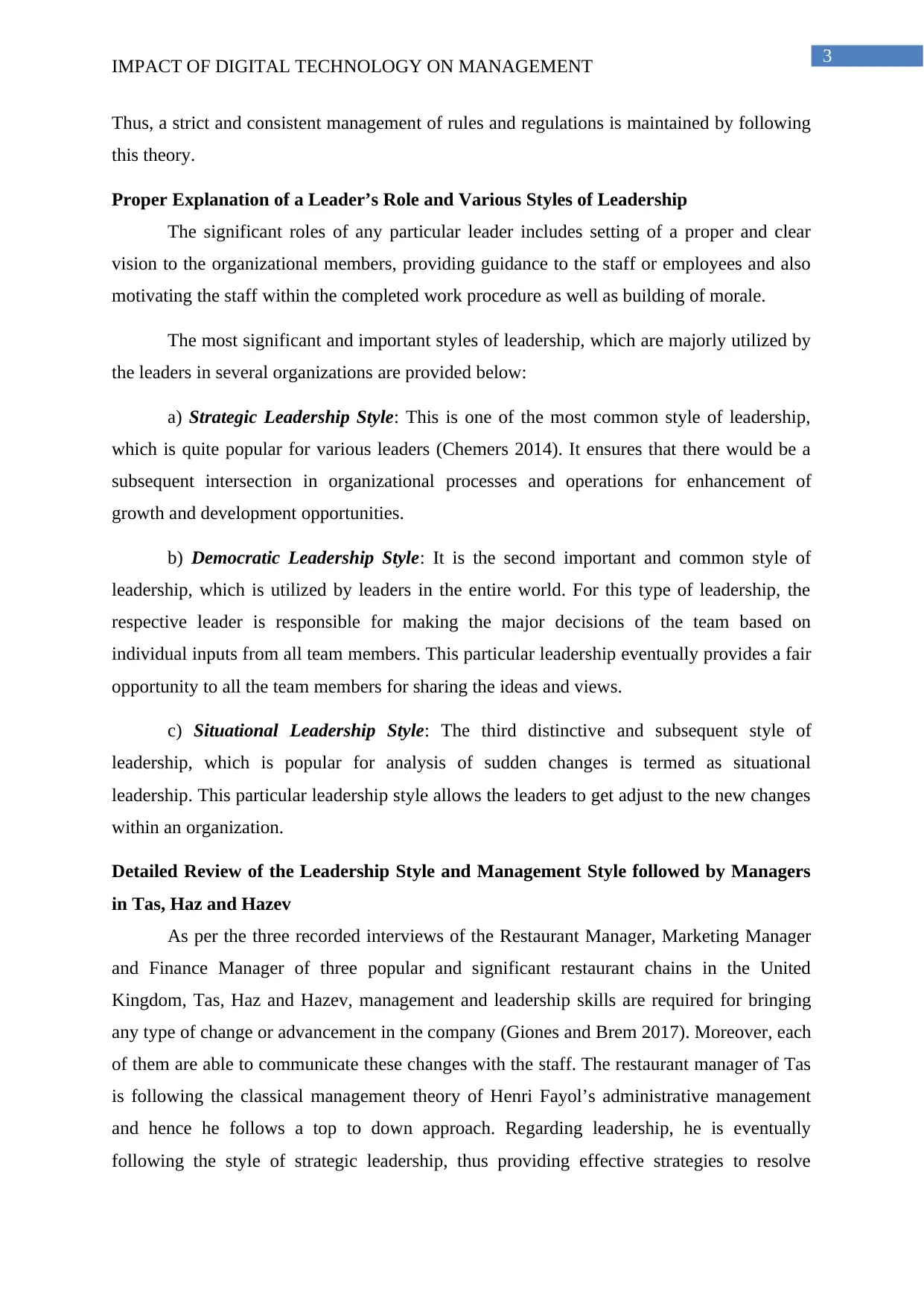
3
IMPACT OF DIGITAL TECHNOLOGY ON MANAGEMENT
Thus, a strict and consistent management of rules and regulations is maintained by following
this theory.
Proper Explanation of a Leader’s Role and Various Styles of Leadership
The significant roles of any particular leader includes setting of a proper and clear
vision to the organizational members, providing guidance to the staff or employees and also
motivating the staff within the completed work procedure as well as building of morale.
The most significant and important styles of leadership, which are majorly utilized by
the leaders in several organizations are provided below:
a) Strategic Leadership Style: This is one of the most common style of leadership,
which is quite popular for various leaders (Chemers 2014). It ensures that there would be a
subsequent intersection in organizational processes and operations for enhancement of
growth and development opportunities.
b) Democratic Leadership Style: It is the second important and common style of
leadership, which is utilized by leaders in the entire world. For this type of leadership, the
respective leader is responsible for making the major decisions of the team based on
individual inputs from all team members. This particular leadership eventually provides a fair
opportunity to all the team members for sharing the ideas and views.
c) Situational Leadership Style: The third distinctive and subsequent style of
leadership, which is popular for analysis of sudden changes is termed as situational
leadership. This particular leadership style allows the leaders to get adjust to the new changes
within an organization.
Detailed Review of the Leadership Style and Management Style followed by Managers
in Tas, Haz and Hazev
As per the three recorded interviews of the Restaurant Manager, Marketing Manager
and Finance Manager of three popular and significant restaurant chains in the United
Kingdom, Tas, Haz and Hazev, management and leadership skills are required for bringing
any type of change or advancement in the company (Giones and Brem 2017). Moreover, each
of them are able to communicate these changes with the staff. The restaurant manager of Tas
is following the classical management theory of Henri Fayol’s administrative management
and hence he follows a top to down approach. Regarding leadership, he is eventually
following the style of strategic leadership, thus providing effective strategies to resolve
IMPACT OF DIGITAL TECHNOLOGY ON MANAGEMENT
Thus, a strict and consistent management of rules and regulations is maintained by following
this theory.
Proper Explanation of a Leader’s Role and Various Styles of Leadership
The significant roles of any particular leader includes setting of a proper and clear
vision to the organizational members, providing guidance to the staff or employees and also
motivating the staff within the completed work procedure as well as building of morale.
The most significant and important styles of leadership, which are majorly utilized by
the leaders in several organizations are provided below:
a) Strategic Leadership Style: This is one of the most common style of leadership,
which is quite popular for various leaders (Chemers 2014). It ensures that there would be a
subsequent intersection in organizational processes and operations for enhancement of
growth and development opportunities.
b) Democratic Leadership Style: It is the second important and common style of
leadership, which is utilized by leaders in the entire world. For this type of leadership, the
respective leader is responsible for making the major decisions of the team based on
individual inputs from all team members. This particular leadership eventually provides a fair
opportunity to all the team members for sharing the ideas and views.
c) Situational Leadership Style: The third distinctive and subsequent style of
leadership, which is popular for analysis of sudden changes is termed as situational
leadership. This particular leadership style allows the leaders to get adjust to the new changes
within an organization.
Detailed Review of the Leadership Style and Management Style followed by Managers
in Tas, Haz and Hazev
As per the three recorded interviews of the Restaurant Manager, Marketing Manager
and Finance Manager of three popular and significant restaurant chains in the United
Kingdom, Tas, Haz and Hazev, management and leadership skills are required for bringing
any type of change or advancement in the company (Giones and Brem 2017). Moreover, each
of them are able to communicate these changes with the staff. The restaurant manager of Tas
is following the classical management theory of Henri Fayol’s administrative management
and hence he follows a top to down approach. Regarding leadership, he is eventually
following the style of strategic leadership, thus providing effective strategies to resolve
Paraphrase This Document
Need a fresh take? Get an instant paraphrase of this document with our AI Paraphraser
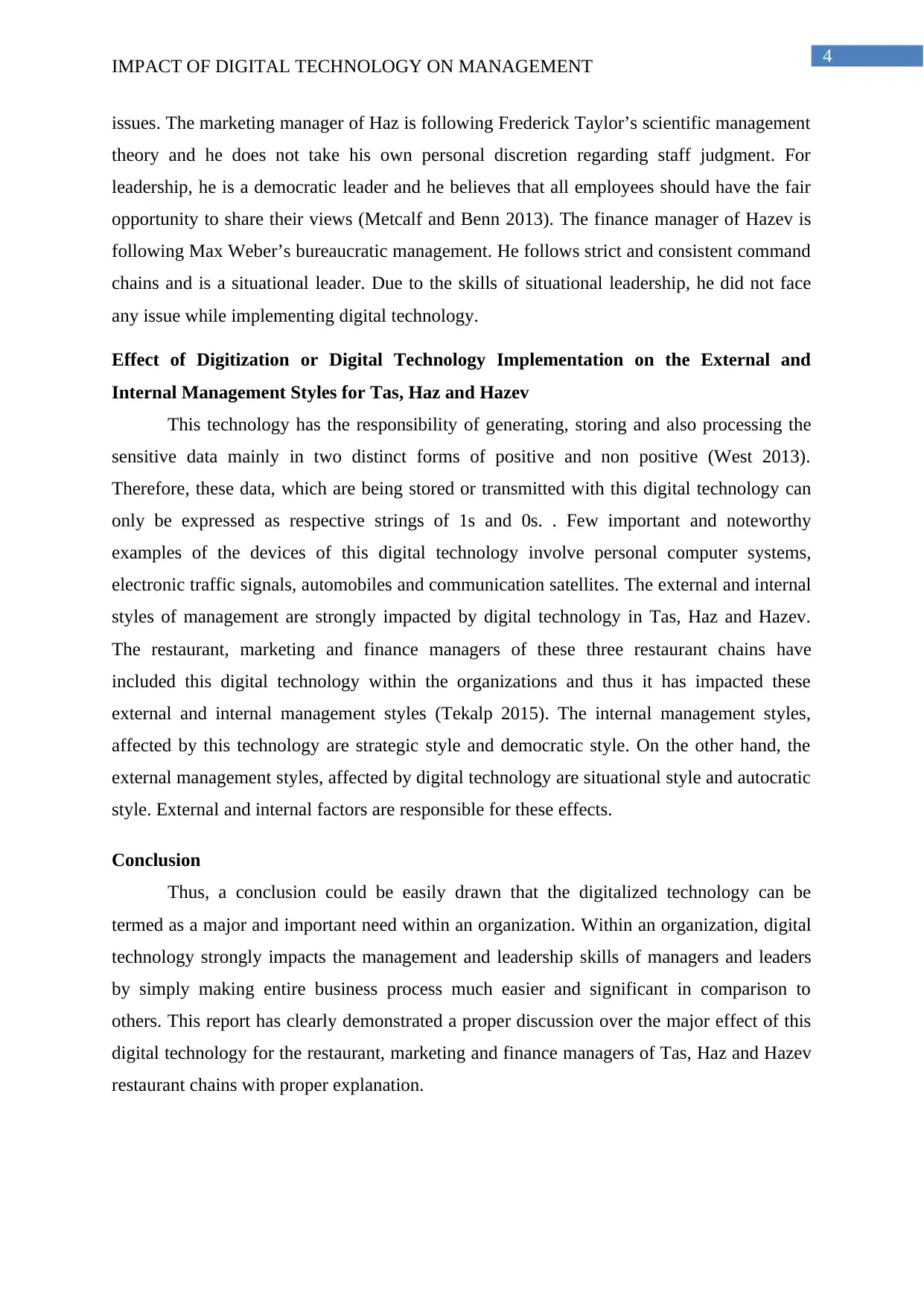
4
IMPACT OF DIGITAL TECHNOLOGY ON MANAGEMENT
issues. The marketing manager of Haz is following Frederick Taylor’s scientific management
theory and he does not take his own personal discretion regarding staff judgment. For
leadership, he is a democratic leader and he believes that all employees should have the fair
opportunity to share their views (Metcalf and Benn 2013). The finance manager of Hazev is
following Max Weber’s bureaucratic management. He follows strict and consistent command
chains and is a situational leader. Due to the skills of situational leadership, he did not face
any issue while implementing digital technology.
Effect of Digitization or Digital Technology Implementation on the External and
Internal Management Styles for Tas, Haz and Hazev
This technology has the responsibility of generating, storing and also processing the
sensitive data mainly in two distinct forms of positive and non positive (West 2013).
Therefore, these data, which are being stored or transmitted with this digital technology can
only be expressed as respective strings of 1s and 0s. . Few important and noteworthy
examples of the devices of this digital technology involve personal computer systems,
electronic traffic signals, automobiles and communication satellites. The external and internal
styles of management are strongly impacted by digital technology in Tas, Haz and Hazev.
The restaurant, marketing and finance managers of these three restaurant chains have
included this digital technology within the organizations and thus it has impacted these
external and internal management styles (Tekalp 2015). The internal management styles,
affected by this technology are strategic style and democratic style. On the other hand, the
external management styles, affected by digital technology are situational style and autocratic
style. External and internal factors are responsible for these effects.
Conclusion
Thus, a conclusion could be easily drawn that the digitalized technology can be
termed as a major and important need within an organization. Within an organization, digital
technology strongly impacts the management and leadership skills of managers and leaders
by simply making entire business process much easier and significant in comparison to
others. This report has clearly demonstrated a proper discussion over the major effect of this
digital technology for the restaurant, marketing and finance managers of Tas, Haz and Hazev
restaurant chains with proper explanation.
IMPACT OF DIGITAL TECHNOLOGY ON MANAGEMENT
issues. The marketing manager of Haz is following Frederick Taylor’s scientific management
theory and he does not take his own personal discretion regarding staff judgment. For
leadership, he is a democratic leader and he believes that all employees should have the fair
opportunity to share their views (Metcalf and Benn 2013). The finance manager of Hazev is
following Max Weber’s bureaucratic management. He follows strict and consistent command
chains and is a situational leader. Due to the skills of situational leadership, he did not face
any issue while implementing digital technology.
Effect of Digitization or Digital Technology Implementation on the External and
Internal Management Styles for Tas, Haz and Hazev
This technology has the responsibility of generating, storing and also processing the
sensitive data mainly in two distinct forms of positive and non positive (West 2013).
Therefore, these data, which are being stored or transmitted with this digital technology can
only be expressed as respective strings of 1s and 0s. . Few important and noteworthy
examples of the devices of this digital technology involve personal computer systems,
electronic traffic signals, automobiles and communication satellites. The external and internal
styles of management are strongly impacted by digital technology in Tas, Haz and Hazev.
The restaurant, marketing and finance managers of these three restaurant chains have
included this digital technology within the organizations and thus it has impacted these
external and internal management styles (Tekalp 2015). The internal management styles,
affected by this technology are strategic style and democratic style. On the other hand, the
external management styles, affected by digital technology are situational style and autocratic
style. External and internal factors are responsible for these effects.
Conclusion
Thus, a conclusion could be easily drawn that the digitalized technology can be
termed as a major and important need within an organization. Within an organization, digital
technology strongly impacts the management and leadership skills of managers and leaders
by simply making entire business process much easier and significant in comparison to
others. This report has clearly demonstrated a proper discussion over the major effect of this
digital technology for the restaurant, marketing and finance managers of Tas, Haz and Hazev
restaurant chains with proper explanation.
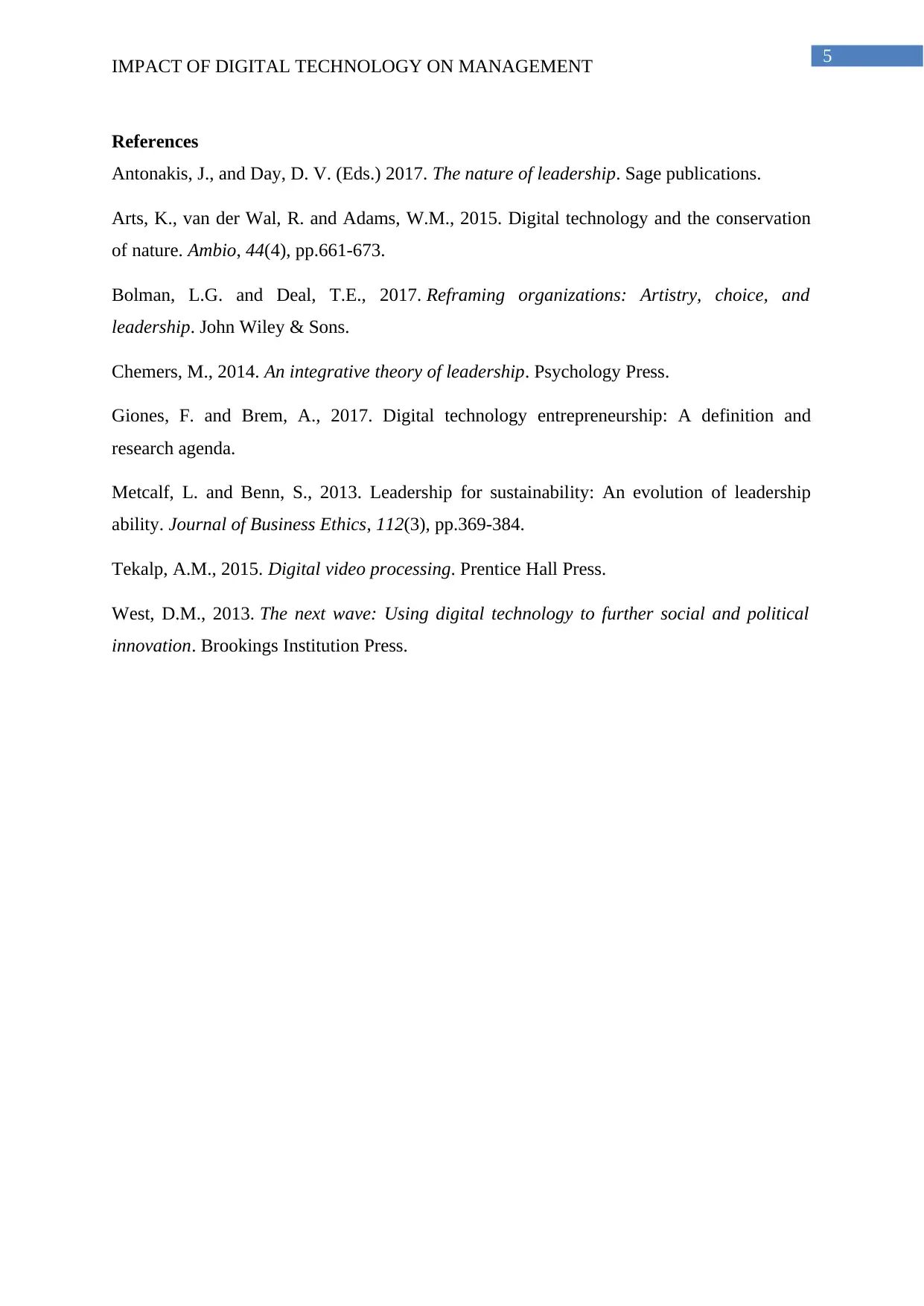
5
IMPACT OF DIGITAL TECHNOLOGY ON MANAGEMENT
References
Antonakis, J., and Day, D. V. (Eds.) 2017. The nature of leadership. Sage publications.
Arts, K., van der Wal, R. and Adams, W.M., 2015. Digital technology and the conservation
of nature. Ambio, 44(4), pp.661-673.
Bolman, L.G. and Deal, T.E., 2017. Reframing organizations: Artistry, choice, and
leadership. John Wiley & Sons.
Chemers, M., 2014. An integrative theory of leadership. Psychology Press.
Giones, F. and Brem, A., 2017. Digital technology entrepreneurship: A definition and
research agenda.
Metcalf, L. and Benn, S., 2013. Leadership for sustainability: An evolution of leadership
ability. Journal of Business Ethics, 112(3), pp.369-384.
Tekalp, A.M., 2015. Digital video processing. Prentice Hall Press.
West, D.M., 2013. The next wave: Using digital technology to further social and political
innovation. Brookings Institution Press.
IMPACT OF DIGITAL TECHNOLOGY ON MANAGEMENT
References
Antonakis, J., and Day, D. V. (Eds.) 2017. The nature of leadership. Sage publications.
Arts, K., van der Wal, R. and Adams, W.M., 2015. Digital technology and the conservation
of nature. Ambio, 44(4), pp.661-673.
Bolman, L.G. and Deal, T.E., 2017. Reframing organizations: Artistry, choice, and
leadership. John Wiley & Sons.
Chemers, M., 2014. An integrative theory of leadership. Psychology Press.
Giones, F. and Brem, A., 2017. Digital technology entrepreneurship: A definition and
research agenda.
Metcalf, L. and Benn, S., 2013. Leadership for sustainability: An evolution of leadership
ability. Journal of Business Ethics, 112(3), pp.369-384.
Tekalp, A.M., 2015. Digital video processing. Prentice Hall Press.
West, D.M., 2013. The next wave: Using digital technology to further social and political
innovation. Brookings Institution Press.
⊘ This is a preview!⊘
Do you want full access?
Subscribe today to unlock all pages.

Trusted by 1+ million students worldwide
1 out of 6
Related Documents
Your All-in-One AI-Powered Toolkit for Academic Success.
+13062052269
info@desklib.com
Available 24*7 on WhatsApp / Email
![[object Object]](/_next/static/media/star-bottom.7253800d.svg)
Unlock your academic potential
Copyright © 2020–2026 A2Z Services. All Rights Reserved. Developed and managed by ZUCOL.





